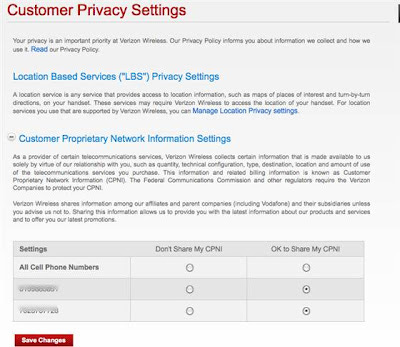How to opt-out of Verizon & AT&T collecting your location data.

It seems like companies are doing everything they can to squeeze extra revenue out of their customers these days by taking advantage of the personal usage data they collect. Google (GOOG) and Facebook (FB) are likely the two tech companies that are most often associated with turning usage data into dollars — Google isn’t even shy about it anymore — but plenty of other companies collect data from their users and use it to make money in a variety of ways. Two such companies, as it turns out, are Verizon Wireless (VZ) and AT&T (T).
UPDATE: A Verizon Wireless spokesperson contacted BGR to confirm that data collected is “anonymous and aggregated,” and to note that users have 30 days from the date they activate a new phone to make an initial decision, but they can then change their privacy settings later at any time.
Mobile developer Ben Clark took a look through Verizon’s privacy policy recently and discovered that the nation’s top carrier takes a number of liberties with user data. Among the data collected and possibly pawned off is “the quantity, technical configuration, type, destination, location and amount of use of the telecommunications services you purchase,” according to Verizon’s terms.
While the data may or may not be made anonymous — Verizon’s verbiage is unclear — the more disheartening fact is that the carrier uses an opt-out policy, meaning it will share your data unless you take action and request that the company keep your info private. Worse still, users only have 30 days from the time they activate a new smartphone to opt out of having their usage data shared.
Of course, Verizon doesn’t go out of its way to make this policy known to customers.
If you purchased a new iPhone 5 or any other smartphone in the past 30 days and you want to stop Verizon from sharing your usage data with advertisers and other companies, simply visit the privacy management page on the carrier’s account management site and select “Don’t Share” for each option that is presented.
AT&T has a similar opt-out policy, but the carrier does not appear to require users to opt out within 30 days of a new activation. AT&T also doesn’t sell the data it collects to outside companies, but instead uses it to “offer you products and services, packages, discounts and promotions from the AT&T companies, such as High Speed DSL Internet access, wireless service and U-verse TV services, which may be different from the types of services you already purchase.”
AT&T customers can still restrict the ways this data is used by visiting this page.
http://www.bgr.com/2012/10/10/verizon-location-data-opt-out-advertising/
Why you should check your Verizon wireless privacy settings right now.
Wireless carriers sell information about your mobile Web searches and other data to marketing companies.
Bryan Clark on App.net was upset when he posted a day ago that "new Verizon customers like us have 30 days to opt-out from them selling your Web history and device location to marketers."
Verizon Wireless told NBC News Wednesday that's not completely accurate.
"Our customers can change their privacy preferences at any time," said a company spokeswoman. "The 30-day window is essentially the initial time frame so customers can read and look at their options, but again, they can change them any time through MyVerizon."
The carrier also wants customers to know that "there are several different programs" it uses for information sharing, if allowed by the subscriber, including a recent program called Precision Market Insights, announced by Verizon Oct. 1.
"Information for Precision is anonymous and aggregated, and not personally identifiable," the Verizon spokeswoman said. "Customers can opt out at any time."
A quick check of your privacy settings with Verizon for a smartphone and a mobile hot spot (below) shows, you might be letting them collect information, including location-based services information. Simply because you have not chosen to opt out by selecting "Don't Share My CPNI" (Customer Proprietary Network Information):

Customers need to take the trouble to find their way to opt out of sharing information. In the case of Verizon Wireless, go to Verizon Wireless online and sign into your account. Scroll down to "I want to ..." and beneath those words you'll see options for "bill" "plan" "device" "profile." Under "profile," choose "Manage privacy settings." That's where you'll find the above check boxes to change. (Be sure to hit "Save changes" when you're done.)
http://www.nbcnews.com/technology/technolog/why-you-should-check-your-verizon-wireless-privacy-settings-right-1C6370918


